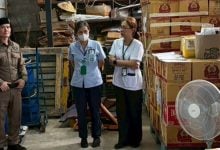Traditional Thai medicine popularity surges amidst Covid-19 crisis

The turbulent times of the Covid-19 pandemic have become a potent catalyst for the growing popularity of Traditional Thai Medicine (TTM), which finds its roots firmly intertwined with diverse aspects of Thai culture, ranging from religious practices to local cuisine. This newfound acceptance of TTM as a fundamental fabric of Thai identity has emerged in the wake of the pandemic.
Traditional medicine in Thailand, known for the utilisation of a broad spectrum of indigenous herbs, has seen a staggering surge in usage, as evidenced by the 20th National Herbs Expo hosted by the Ministry of Public Health. Spanning five days, from June 28 to July 2, this event provided a platform for active dialogue among professionals in the field, budding entrepreneurs, and visitors keenly interested in the mystique of TTM.
Thai traditional medicine was primarily perceived as a dietary supplement before Covid. However, the lockdown-triggered medicine shortage transformed this perception, driving a significant shift towards the acceptance of traditional treatments, noted Pakakrong Kwankhao, head of the Thai Traditional and Herbal Medicine Centre at Chao Phya Abhaibhubejhr Hospital. Moreover, the success of herbal treatments in combating Covid led to a rise in younger demographics turning to Thai traditional medicine.
According to Adisorn Pukanad of the Thai Traditional Medicine Foundation, TTM is synonymous with convenience. There are no hospital visits requisite, nor prescriptions from doctors necessary to avail these treatments.
“Although the efficacy may be lower, it is friendlier to health.”
In light of the market shift towards herbal remedies, companies like Herbal One have observed that their consumer base, primarily individuals above the age of 30, is beginning to recognise the value of these natural alternatives.
Traditional Thai remedies also extend beyond the ingestion of herbs. Jua Inthan, a traditional massage therapist, advocates massage therapy using luk prakob, or herbal compress ball. The herbs in the luk prakob, believed to stimulate blood circulation, are steamed and seep into the skin during the massage.
However, as the user base of Thai traditional medicine grows, so do the questions about efficacy and safety around these treatments. Critics argue that much of the knowledge surrounding Thai traditional medicine is anecdotal, rooted in practitioner experience and historical data, rather than grounded in scientific evidence.
Four decades ago, herbal doctors comprised a mere 2 to 3% of medical professionals, with the majority being practitioners of conventional Western medicine, recalled Dr Pakakrong. Herbs were regarded more as garden vegetables rather than potential medicine.
In a bid to elevate the standing of herbs, professionals at Chaophraya Abhaibhubejhr Hospital are undertaking stringent research to bolster the potential of herbal treatments in curing ailments. While the production of these treatments rises to meet soaring demand, the Department of Medical Science (DMS) also conducts laboratory tests to ensure the safety of these herbs for consumers, reported Bangkok Post.
Patamaporn Prueksakorn, a pharmacist at DMS, believes that this diligence in research and certification will be instrumental in boosting the commercial promotion and export of Thai herbs across international borders, sparing them from quality inspections in the destination countries.
The Ministry of Public Health took a crucial step in 2002 by establishing the Department of Thai Traditional and Alternative Medicine, aiming to protect, promote and integrate traditional Thai medicinal practices into the comprehensive modern healthcare system.
Latest Thailand News
Follow The Thaiger on Google News:


























